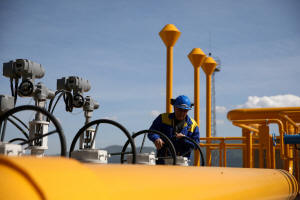EU leaders squabble over energy crunch response
 Send a link to a friend
Send a link to a friend
 [October 07, 2022]
By Jason Hovet, Sabine Siebold and Robert Muller [October 07, 2022]
By Jason Hovet, Sabine Siebold and Robert Muller
PRAGUE (Reuters) -Divisions between
European Union leaders over capping gas prices and national rescue
packages resurfaced on Friday, with Poland accusing Germany of
"selfishness" in its response to a winter energy crunch caused by
Russia's war in Ukraine.
A majority of EU states has asked Brussels to propose a cap on gas
prices, but they disagree on the details. Some capitals seek a broad cap
on all gas trades and import contracts, while others prefer a limited
cap in the power sector only.
The cap is among a range of proposals and initiatives by European states
to cope with plummeting gas supplies from Russia, which once supplied
40% of Europe's needs, and rocketing prices. They have eased off this
year's peaks but remain more than 200% higher than at the start of Sept.
2021.
Germany, Denmark and the Netherlands oppose a cap, worried that it would
make it difficult to buy the gas their economies need and dampen any
incentive to reduce consumption.

Arriving for an EU summit at Prague Castle, Austrian Chancellor Karl
Nehammer said any price cap must be devised and implemented in a way
that supports power suppliers.
"The negotiations are ongoing. And they will be intense because... it is
our goal to support... energy providers with it, so that the supply of
gas does not decrease," he said.
Czech Prime Minister Petr Fiala specifically mentioned capping prices of
gas used for electricity production, while Latvia's Krisjanis Karins
said a cap would be "grand" if the bloc could still ensure supplies from
producers.
Luxembourg's Prime Minister Xavier Bettel cautioned that the EU should
be careful not to harm its position in global markets by driving sellers
away with an unattractive cap, because "maybe we (then) have a price cap
but no energy".
The summit's chairman, European Council President Charles Michel, said
no decisions were expected on Friday but hoped the discussion among
leaders would lead to a deal when they next meet on Oct. 20-21.
POLAND FUMES
Polish Prime Minister Mateusz Morawiecki criticised Germany over what he
sees as lavish spending of 200 billion euros ($196 billion) in subsidies
to shield consumers and businesses from soaring energy costs.
[to top of second column]
|

An employee works at Bulgartransgaz gas
compressor station near Ihtiman, Bulgaria, May 12, 2022. REUTERS/Stoyan
Nenov/File Photo

"German selfishness must be put away in the cupboard," he said,
repeating concerns about a fiscal divide separating wealthy
countries that can afford to spend heavily on domestic subsidies and
those that cannot.
But Belgium's Alexander De Croo said big national support packages
were necessary in the absence of any pan-EU action.
"We could not just leave people coping with the cold weather," he
told reporters. "But the real solution is that we act together in
the market and then those big (national) support packages won't be
necessary anymore."
Economy Commissioner Paolo Gentiloni warned that amid a difficult
economic environment "the only thing we cannot afford in the current
geopolitical context is division, fragmentation... a division
between European countries".
With EU gas storages 90% full, European Commission chief Ursula von
der Leyen said the bloc was well prepared for winter.
"We have a first line of protection for our market. Now it is time
to discuss how we can limit the peaks in energy prices, and the
manipulation of energy prices by (Russian President Vladimir)
Putin," she said.
The leaders will also discuss in Prague providing more financial and
military support to Ukraine.
($1 = 1.0199 euros)
(Reporting by Jan Strupczewski, Kate Abnett, Jason Hovet, Alan
Charlish, Sabine Siebold, Michel Rose, Michael Kahn, Pawel
Florkiewicz, Marine Strauss, Sudip Kar-Gupta, Charlotte van
Campenhout ; editing by Richard Pullin; Writing by Anthony
DeutschEditing by Gareth Jones)
[© 2022 Thomson Reuters. All rights
reserved.]
This material may not be published,
broadcast, rewritten or redistributed.
Thompson Reuters is solely responsible for this content.
 |